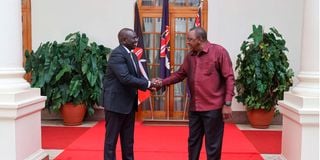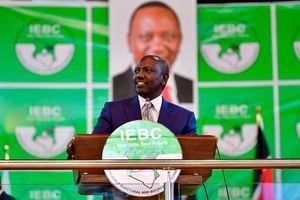
President William Ruto addresses wananchi during the launch of the affordable housing project in Nanyuki town on January 10, 2024. He has renewed his ‘poor vs rich’ narrative.
President William Ruto has reignited the poor versus the rich narrative by blaming those supposedly in privileged positions for frustrating his pet projects meant to create jobs for the downtrodden, echoing the intense 2022 elections campaign.
In a continuation of the ‘hustler versus the dynasty’ narrative that President Ruto sold to groups generally typified as boda boda, the unemployed youths and mama mboga (grocers) to ascend to presidency, Kenya Kwanza politicians are at it again, blaming the “rich” over its failures to implement lofty promises they made to Kenyans.
Dr Ruto endeared himself to the electorate in the polls by labelling Opposition leader Raila Odinga, who had the backing of former President Uhuru Kenyatta, as dynasty, blaming them for the poverty facing a majority of Kenyans.
Although he had been in government for nearly all his life after graduating from the university, President Ruto projected himself as a chicken seller who went to school barefoot and made it through sheer hard work despite opposition from well-established individuals.
In the run-up to the August 2022 elections, Dr Ruto said that his bottom-up economic model would spur economic growth among the poor, as opposed to the ‘trickle-down approach’ by the dynasties that he said had only succeeded in enriching a few individuals.

Former President Uhuru Kenyatta receives President William Ruto at State House, Nairobi on September 11, 2022.
But almost one-and-a-half years after ascending to power and struggling to deliver most of his pre-election promises of creating jobs for millions of youths, prioritise the needs of low-income earners and bring down the cost of living, Dr Ruto is once blaming the “rich” or “those with pay slip”, again, in his countrywide tours.
Following a string of court orders putting a brake on some of his pet projects like affordable housing and the Social Health Insurance Fund (SHIF), which he claims are designed to create jobs for the youth and provide universal healthcare for the poor, Dr Ruto has been on a tirade blaming some judicial officers for working with privileged cartels to deny the poor opportunities.
The President tells his supporters in rallies how he seeks to reduce their NHIF contribution from the current Sh500 to Sh300, but is being blocked by privileged individuals whose medical covers are paid for by the taxpayers’ money.
It is the same narrative about affordable housing, which he says is meant to create jobs for the unemployed as well as ensure the poor live in decent houses, just like the wealthy.
Some of his allies have sensationally claimed that those opposed to the housing project are the wealthy landlords, who do not want the poor to own homes so that they can continue exploiting them with rent.
In some of his recent public rallies, he has been telling the unemployed that the new statutory deductions – including the 1.5 percent housing levy, the proposed 2.7 percent levy for healthcare and enhanced National Social Security Fund (NSSF) – are deductions from privileged salaried Kenyans to support programmes for the poor, wondering why the poor should oppose the deductions when it is not them whose salaries are being deducted.
“I am saying that the people with pay slips should contribute something for us to plan the employment for those of you without a pay slip. The workers don’t want to be deducted because they want you to stay in the streets,” he said in Busia.
He went on, “If you (the unemployed) are supporting us by paying salaries of teachers, doctors, MCAs, MPs and the President, where is the mistake in deducting three percent of our salaries to create jobs for you?”.
But even as he categorised salaried Kenyans as privileged, data by the Kenya National Bureau of Statistics last year shows that nearly two-thirds of the formal workers in Kenya take home less than Sh50,000 monthly.
Workers in Nairobi and other major towns can barely meet their daily needs as a result of high cost of living, coupled with additional statutory deductions. According to the official data, 1.82 million workers, representing 60.5 percent, earn below Sh50,000 while another 17 percent earn below Sh30,000.
Critics of this narrative say it may work for the President in the short run in whipping up emotions of the majority power but in the long run, it has a potential of starting a class war.
“These people are propagandists. They want to set one group against the other. The other day they were telling people that salaried Kenyans do not want to pay taxes for the poor to benefit when we have no salaried Kenyans who are doing much better than those in employment,” said DAP-K Secretary General Eseli Simuyi.
University lecturer and political analyst David Monda said that Dr Ruto, having won election through the same narrative has made people he categorises as “the rich”—which in his broad definition includes any salaried employee — his bogeyman for any hurdles faced by his administration.
Prof Monda noted that a majority of Kenyans are getting sceptical whether the funds were meant to solve some of the problems being bandied around by the ruling alliance.
“The elites in government accusing the ‘rich’ of being against housing and healthcare programmes, are themselves rich and are not really being honest with the public,” said Prof Monda. “So, like the boy who cried wolf, Ruto will only get away with the hustlers vs dynasties for so long. At some point, he will have to address the problems Kenyans are facing. That is to say runaway corruption, nepotism, negative ethnicity, an imperial presidency and poor governance. The hustlers vs rich cannot be the smokescreen for the failings of the government.”
The class narrative formed the bulk of the President’s New Year address from State House, Nakuru, when he accused some public officers, including judges, of working with cartels to deny the poor opportunity to benefit from some of State projects.
“This is what happens when a public servant, enjoying a house mortgage at a 3 percent interest rate, makes decisions that frustrate the housing programme, robbing millions of youth of employment prospects and denying millions of Kenyans the chance to own a home like them,” he said in his address.
He went on to say that it was the same case when a public officer, who benefits from unlimited medical insurance, invokes the law to derail the universal healthcare delivery designed to support millions of vulnerable Kenyans.
Dr Ruto believes that the housing project will offer jobs to the unemployed youths. But his critics say he is struggling to deliver and is now looking for a scapegoat. Some of his opponents have described the jobs available in house construction as temporary and low-wage, and cannot address unemployment of university graduates.
However, a World Bank report pointed out that the proliferation of low-wage informal sector jobs has derailed Kenya’s progress on poverty eradication.
ODM Secretary General Edwin Sifuna and Vihiga Senator Godfrey Osotsi described the renewed class narrative as a desperate attempt by President Ruto to save face after failing to deliver on most of his promises.
“Ruto has been found out as we say. The people know he is a snake oil salesman. He can try to rehash some of his past big hits like setting up Kenyans against each other but the people now know (who he is),” said Mr Sifuna. “It won’t matter what he says going forward, no one will believe him.”
Mr Ososti said the so-called hustlers are all disappointed after what they were promised was not delivered.
“He had promised to include them in his government but only appointed millionaires into his administration. He cannot purport to care for them but when making appointments he picks his rich cronies,” he said. “The houses he claims to build cannot be afforded by the hustlers. How is he creating jobs? The temporary mjengo jobs cannot qualify to be an employment.”
In an earlier interview with Nation , National Assembly Majority Leader Kimani Ichung’wah said the housing and universal healthcare were being fought by people who want to continue benefiting at the expense of the poor.
“It is a travesty of justice that a few of us who are able to stop millions of other Kenyans who have no access to jobs, who have no access to a means of livelihood from having a means of livelihood simply because we want to serve our own selfish political interests and selfish business interest because that is the case that is there with housing and UHC (Universal health care),” said Mr Ichung’wah.












